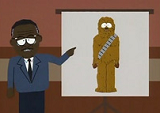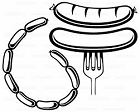I got called for jury duty recently. I didn’t get picked for a jury (not sorry), but we all went through voir dire. The nature of the defense attorney’s questions to the potential jurors suggested clearly (I thought, anyway) what the shape of his defense was going to be—basically, impeach the results of breathalyzer tests.
 That experience, along with the recent death of the actor Peter Mayhew, reminded me of a term I learned recently: the Chewbacca defense. The term originated in the TV program South Park, in an episode that satirized the O. J. Simpson trial. In the episode, the defense attorney asks the jury why Chewbacca would want to live with the Ewoks. Which has nothing to do with the trial, and whose only purpose is to confuse the jury.
That experience, along with the recent death of the actor Peter Mayhew, reminded me of a term I learned recently: the Chewbacca defense. The term originated in the TV program South Park, in an episode that satirized the O. J. Simpson trial. In the episode, the defense attorney asks the jury why Chewbacca would want to live with the Ewoks. Which has nothing to do with the trial, and whose only purpose is to confuse the jury.
The Chewbacca defense is a variant on the Gish Gallop (visited upon earlier) and the generic “baffle ‘em with bullshit” approach to argumentation. But the real question is “does it work?” It seems so. According to an anonymous poster in Quora:
The Chewbacca Defense relies on several truisms about trials; (1) juries are often intimidated, confused or bewildered about anything that goes on in a courtroom; (2) most people think they know way more about the law and legal concepts then they really do; and (3) anything can sound convincing if said in an authoritative, confident and persuasive manner.
Apparently it’s a tactic favored not only in DUI cases like the one I missed being on but in trials that involve DNA. The anonymous poster notes the Chewbacca defense is useful for a lawyer …
… where scientific and/or forensic evidence is so overwhelmingly against one side that he or she or it has no choice but to try to dazzle the jury into thinking that the issues regarding this evidence are so complex and beyond their ken that they cannot fairly resolve them in in this proceeding and must therefore disregard the evidence as untrustworthy or insufficient.
Although I’m not sad to have missed being on the jury, I am curious whether this type of Chewbacca defense was what the defense lawyer ultimately attempted.
Ok, let's move on to origins. Based on a recommendation by the lexicographer Serenity Carr, I'm browsing through the book Etymologicon by Mark Forsyth, a.k.a. the Inky Fool. Boy, if you like word histories, this is a book for you. On every page I find another delightful etymology.
So, Botox. This is a brand name for a drug that's used to temporarily paralyze muscles, an effect that can be used as treatment for several conditions, famously wrinkly-ness. The brand name comes from botulinum toxin; as that term implies, it's a toxin produced by the botulinum bacteria. This is a bad toxin; if you eat food contaminated by this bacteria, you can get botulism, a food poisoning that can kill you quite dead.
 So far, so good. (Or so bad, I suppose, if you got it.) Botulism as a condition was identified in the 1820s by the German doctor Justinus Kerner, who studied the paralytic effects on a variety of animals and on himself(!). In an era before germ theory, he correctly identified the malady as a food-borne one. The vector seemed to him to be bad sausages, so he named the disease Botulismus for the Latin word for sausage: botulus. Technically, in English the word botulism is a borrowing from German.
So far, so good. (Or so bad, I suppose, if you got it.) Botulism as a condition was identified in the 1820s by the German doctor Justinus Kerner, who studied the paralytic effects on a variety of animals and on himself(!). In an era before germ theory, he correctly identified the malady as a food-borne one. The vector seemed to him to be bad sausages, so he named the disease Botulismus for the Latin word for sausage: botulus. Technically, in English the word botulism is a borrowing from German.
Kerner was in tune with the scientific thinking of the times, which is why he turned to Latin to name the disease he'd discovered. It's a little sad that he didn't turn to his native language. Just think how close we came to talking about cases of wurstism, eh?
Like this? Read all the Friday words.
 |
|

 |
|
